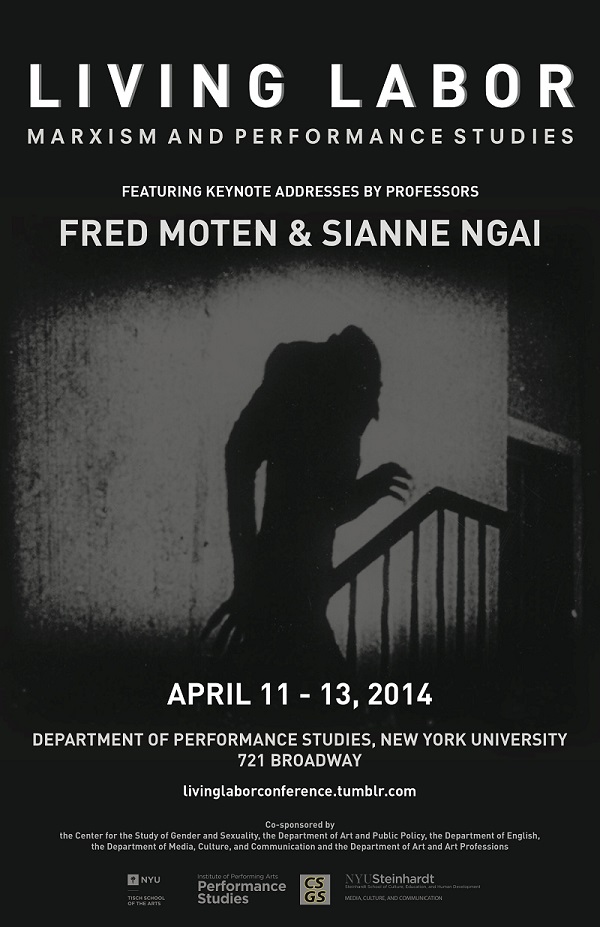To live and to labor are the twinned imperatives to which we are always already given. Together, they animate a rhythm of material production and reproduction across time. Marxism and performance studies both offer ways of thinking through the imbrication of life and labor. On one hand, Marxist theory historically attends to the capture and distribution of life: to the maintenance and reproduction of labor power, as well as to the processes of commodification and consumption that produce value for capital. On the other hand, performance studies is a field in which questions of life and labor are central, surfacing in discourses of force, liveness, endurance, iterability, and the everyday: it is concerned with not only what things mean, but what they do. By bringing Marxist and performance theory together, this conference asks how thinking about life and labor between these two bodies of literature can help us attend to the world at hand.
How does performance analysis bring together the living body and the working body? How do Marxist and Marxist-inspired philosophies articulate and reimagine labor, value, and revolutionary struggle, particularly in relation to the social, aesthetic and political dimensions of performance and performativity? Marxism, in its many iterations, offers a methodology of thinking about materiality, temporality, and movement that revivifies an enduring question in performance studies: What can a body do? This question not only makes explicit the convergence between Marxist and performance theory, but also makes central critical traditions of black, feminist, and queer Marxism in which relationships between life, labor, and capitalism have never been incidental. The material experience and historical condition of race, gender, and sexuality is, in this sense, the premise that animates our Marxist considerations of what it means to live, labor, and perform.
To live labor is to negotiate the extended processes of reproducing ourselves and others. To live labor is to engage the material conditions that traverse personhood and thinghood. To live labor is to attend to the forces, resonances, and energies that intertwine in the affects and objects of everyday life. For this reason, Living Labor: Marxism and Performance Studies invites submissions that explore the intersections of performance studies and Marxist philosophies. Papers may intervene at points of seeming incompatibility, address convergences, or look forward to emerging discourses relating to this nexus.
Topics may engage, though are not limited to:
- Queer failure and futurity: nonproductivity and reproductivity, utopianism and time
- Feminism and reproductive labor: “undifferentiated” matter and sexual difference
- Consent and contracts: the marriage contract, the labor contract, and the non-consensual and non-contractual relations of trans-Atlantic slavery
- Capitalism, racialization, and racism
- Work and non-work: time-wasting, narcissism, and boredom as collective practices
- Materialism and immaterialism: from surface readings to speculative realism
- Contagion and speculation: the transmissibility of debt, theories of abjection, excess as a surplus value
- Value and magic: commodity fetishism as it troubles personhood and thinghood, vibrant matter, animacies, and enchantment
- Bodily capacity to embodied materiality: disability, labor, and dance
- Matter and movement: vibrational ontology, repetition and difference, temporalities of revolution
- Subjecthood and the question of sovereignty: biopolitics, necropolitics, and bare life
- Repetition and reproduction: speech acts, performativity and periperformativity, iterability and resignification
- Living in common, working apart: the commons, communism, collectivity
- Autonomy and mass-production: the art object and the factory line
- Doing abstraction: financialization and performative force
- The arts and the university as a market: institutional critiques and critical perspectives on the performative turn within the arts and humanities


